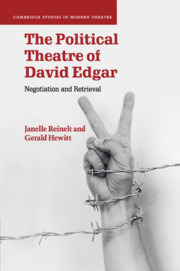2 - Intervening in public discourse
Edgar as commentator and activist
Published online by Cambridge University Press: 05 August 2011
Summary
In his role as a public intellectual, David Edgar combines a robust and unique blend of technical skills, creative talent, comprehensive understanding, passionate conviction, linguistic wit, and a capacity for sheer hard work. He grew up in a theatre family, his father an actor and stage manager at Birmingham Rep and then a television producer for the BBC. His mother was an actor and radio announcer, and his aunt Nancy Burman was a theatre administrator, running Birmingham Rep in the 1960s and 1970s. In such a family, Edgar learned early the nature and value of performance and the need to be performative – as well as some of the costs of doing so.
Edgar attended Oundle public school near Peterborough in Cambridgeshire, and then read English Literature at the University of Manchester, reinforcing and developing a lifelong enjoyment of words, rhetoric, wit, and language. He was editor of the college newspaper and developed his political commitments protesting against the Vietnam war and university exam policies. His first employment was as a reporter on the Bradford Telegraph and Argus. (Good) journalism entails reporting on, and intervening in, public events and discourse, emphasizes fact-based evidence behind positions, and retrieves significant disclosures from seemingly commonplace phenomena – all valuable skills for a lifetime of writing and activism.
- Type
- Chapter
- Information
- The Political Theatre of David EdgarNegotiation and Retrieval, pp. 35 - 62Publisher: Cambridge University PressPrint publication year: 2011



